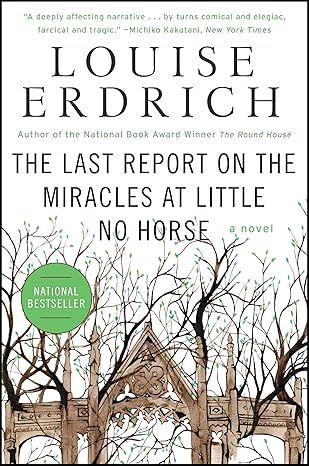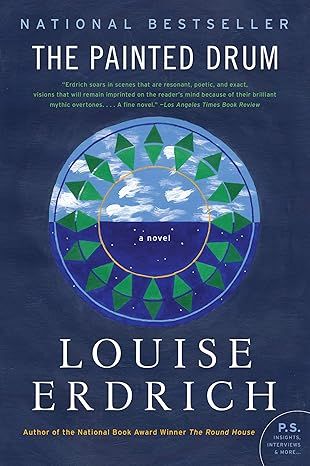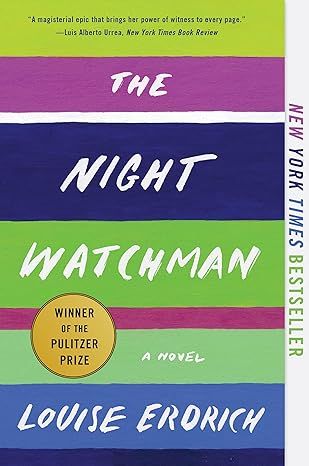The Night Watchman: A Novel
4.4
-
21,822 ratings
WINNER OF THE 2021 PULITZER PRIZE FOR FICTION
NEW YORK TIMES BESTSELLER
WASHINGTON POST, NPR, CBS SUNDAY MORNING, KIRKUS, CHICAGO PUBLIC LIBRARY, AND GOOD HOUSEKEEPING BEST BOOK OF THE YEAR
Based on the extraordinary life of National Book Award-winning author Louise Erdrich’s grandfather who worked as a night watchman and carried the fight against Native dispossession from rural North Dakota all the way to Washington, D.C., this powerful novel explores themes of love and death with lightness and gravity and unfolds with the elegant prose, sly humor, and depth of feeling of a master craftsman.
Thomas Wazhashk is the night watchman at the jewel bearing plant, the first factory located near the Turtle Mountain Reservation in rural North Dakota. He is also a Chippewa Council member who is trying to understand the consequences of a new “emancipation” bill on its way to the floor of the United States Congress. It is 1953 and he and the other council members know the bill isn’t about freedom; Congress is fed up with Indians. The bill is a “termination” that threatens the rights of Native Americans to their land and their very identity. How can the government abandon treaties made in good faith with Native Americans “for as long as the grasses shall grow, and the rivers run”?
Since graduating high school, Pixie Paranteau has insisted that everyone call her Patrice. Unlike most of the girls on the reservation, Patrice, the class valedictorian, has no desire to wear herself down with a husband and kids. She makes jewel bearings at the plant, a job that barely pays her enough to support her mother and brother. Patrice’s shameful alcoholic father returns home sporadically to terrorize his wife and children and bully her for money. But Patrice needs every penny to follow her beloved older sister, Vera, who moved to the big city of Minneapolis. Vera may have disappeared; she hasn’t been in touch in months, and is rumored to have had a baby. Determined to find Vera and her child, Patrice makes a fateful trip to Minnesota that introduces her to unexpected forms of exploitation and violence, and endangers her life.
Thomas and Patrice live in this impoverished reservation community along with young Chippewa boxer Wood Mountain and his mother Juggie Blue, her niece and Patrice’s best friend Valentine, and Stack Barnes, the white high school math teacher and boxing coach who is hopelessly in love with Patrice.
In the Night Watchman, Louise Erdrich creates a fictional world populated with memorable characters who are forced to grapple with the worst and best impulses of human nature. Illuminating the loves and lives, the desires and ambitions of these characters with compassion, wit, and intelligence, The Night Watchman is a majestic work of fiction from this revered cultural treasure.
Read more
Kindle
$14.99
Available instantly
Audiobook
$0.00
with membership trial
Hardcover
$15.11
Paperback
$10.77
Ships from
Amazon.com
Payment
Secure transaction
ISBN-10
0062671197
ISBN-13
978-0062671196
Print length
464 pages
Language
English
Publisher
Harper Perennial
Publication date
March 22, 2021
Dimensions
5.31 x 1.06 x 8 inches
Item weight
11.2 ounces
Popular Highlights in this book
The only way to fight the righteous was to present an argument that would make giving him what he wanted seem the only righteous thing to do.
Highlighted by 2,919 Kindle readers
The services that the government provides to Indians might be likened to rent. The rent for use of the entire country of the United States.
Highlighted by 2,596 Kindle readers
When Thomas thought of his father, peace stole across his chest and covered him like sunlight.
Highlighted by 1,989 Kindle readers
Product details
ASIN :
B07SKWFVYW
File size :
4425 KB
Text-to-speech :
Enabled
Screen reader :
Supported
Enhanced typesetting :
Enabled
X-Ray :
Enabled
Word wise :
Enabled
Award winners:
Editorial reviews
“Erdrich delivers a magisterial epic that brings her power of witness to every page…We are grateful to be allowed into this world…I walked away from the Turtle Mountain clan feeling deeply moved, missing these characters as if they were real people known to me. In this era of modern termination assailing us, the book feels like a call to arms. A call to humanity. A banquet prepared for us by hungry people.” — Luis Alberto Urrea, New York Times Book Review
"With The Night Watchman, Louise Erdrich rediscovers her genius…This tapestry of stories is a signature of Erdrich’s literary craft, but she does it so beautifully that it’s tempting to forget how remarkable it is…This narrator’s vision is more capacious, reaching out across a whole community in tender conversation with itself. Expecting to follow the linear trajectory of a mystery, we discover in Erdrich’s fiction something more organic, more humane. Like her characters, we find ourselves “laughing in that desperate high-pitched way people laugh when their hearts are broken.” — Ron Charles, Washington Post
"Louise Erdrich's The Night Watchman is a singular achievement even for this accomplished writer. . . Erdrich, like her grandfather, is a defender and raconteur of the lives of her people. Her intimate knowledge of the Native American world in collision with the white world has allowed her, over more than a dozen books, to create a brilliantly realized alternate history as rich as Faulkner’s Yoknapatawpha County, Mississippi.” — O, The Oprah Magazine
“In powerfully spare and elegant prose, Erdrich depicts deeply relatable characters who may be poor but are richly connected to family, community and the Earth.” — Patty Rhule, USA Today
“Erdrich’s newest novel thrills with luminous empathy.” — Boston Globe
“No one can break your heart and fill it with light all in the same book — sometimes in the same paragraph — quite like Louise Erdrich…She does it again, and beautifully, in her new book…gorgeously written, deeply humane…Erdrich’s writing about the bonds of marriage and family is one of the greatest strengths of her fiction. She captures all the affection, teasing, pain and forgiveness it takes to hold a family together.” — Tampa Bay Times
“What is most beautiful about the book is how this family feeling manifests itself in the way the people of The Night Watchman see the world, their fierce attachment to each other, however close or distant, living or dead.” — Minneapolis Star-Tribune
“Louise Erdrich is one of our era’s most powerful literary voices…In The Night Watchman Erdrich’s blend of spirituality, gallows humor, and political resistance is at play…It may be set in the 1950s, but the history it unearths and its themes of taking a stand against injustice are every bit as timely today.” — Christian Science Monitor
"Erdrich’s inspired portrait of her own tribe’s resilient heritage masterfully encompasses an array of characters and historical events. Erdrich remains an essential voice.” — Publishers Weekly
“National Book Award winner Erdrich once again calls upon her considerable storytelling skills to elucidate the struggles of generations of Native people to retain their cultural identity and their connection to the land.” — Library Journal, Starred Review
“A spellbinding, reverent, and resplendent drama…A work of distinct luminosity…Through the personalities and predicaments of her many charismatic characters, and through rapturous descriptions of winter landscapes and steaming meals, sustaining humor and spiritual visitations, Erdrich traces the indelible traumas of racism and sexual violence and celebrates the vitality and depth of Chippewa life…Erdrich at her radiant best.” — Booklist (starred review)
“In this kaleidoscopic story, the efforts of Native Americans to save their lands from being taken away by the U.S. government in the early 1950s come intimately, vividly to life…A knowing, loving evocation of people trying to survive with their personalities and traditions intact.” — Kirkus Reviews (starred review)
“The Night Watchman is above all a story of resilience…It is a story in which magic and harsh realities collide in a breathtaking, but ultimately satisfying way. Like those ancestors who linger in the shadows of the pages, the characters Erdrich has created will remain with the reader long after the book is closed.” — New York Journal of Books
“This clever, artful and compelling novel tells an important story, one to open our hearts and minds. If you’re looking for a book that is smart and discussable, tender and painful, riveting and elegant, you’ll find it in THE NIGHT WATCHMAN.” — BookReporter.com
“Erdrich has chosen a story that is near to her heart, and it shines through on every page…The connection between Erdrich’s characters and the natural world is unbreakable, and some of her most evocative passages are dedicated to this relationship.” — Philadelphia Inquirer
Read more
Sample
September 1953
Turtle Mountain Jewel Bearing Plant
Thomas Wazhashk removed his thermos from his armpit and set it on the steel desk alongside his scuffed briefcase. His work jacket went on the chair, his lunch box on the cold windowsill. When he took off his padded tractor hat, a crab apple fell from the earflap. A gift from his daughter Fee. He caught the apple and put it out on the desktop to admire. Then punched his time card. Midnight. He picked up the key ring, a company flashlight, and walked the perimeter of the main floor.
In this quiet, always quiet expanse, Turtle Mountain women spent their days leaning into the hard light of their task lamps. The women pasted micro-thin slices of ruby, sapphire, or the lesser jewel, garnet, onto thin upright spindles in preparation for drilling. The jewel bearings would be used in Defense Department ordnance and in Bulova watches. This was the first time there had ever been manufacturing jobs near the reservation, and women filled most of these coveted positions. They had scored much higher on tests for manual dexterity.
The government attributed their focus to Indian blood and training in Indian beadwork. Thomas thought it was their sharp eyes—the women of his tribe could spear you with a glance. He’d been lucky to get his own job. He was smart and honest, but he wasn’t young and skinny anymore. He got the job because he was reliable and he knocked himself out to do all that he did as perfectly as he could do it. He made his inspections with a rigid thoroughness.
As he moved along, he checked the drilling room, tested every lock, flipped the lights on and off. At one point, to keep his blood flowing, he did a short fancy dance, then threw in a Red River jig. Refreshed, he stepped through the reinforced doors of the acid washing room, with its rows of numbered beakers, pressure dial, hose, sink, and washing stations. He checked the offices, the green-and-white-tiled bathrooms, and ended up back at the machine shop. His desk pooled with light from the defective lamp that he had rescued and repaired for himself, so that he could read, write, cogitate, and from time to time slap himself awake.
Thomas was named for the muskrat, wazhashk, the lowly, hardworking, water-loving rodent. Muskrats were everywhere on the slough-dotted reservation. Their small supple forms slipped busily through water at dusk, continually perfecting their burrows, and eating (how they loved to eat) practically anything growing or moving in a slough. Although the wazhashkag were numerous and ordinary, they were also crucial. In the beginning, after the great flood, it was a muskrat who had helped remake the earth.
In that way, as it turned out, Thomas was perfectly named.
Lard on Bread
Pixie Paranteau dabbed cement onto a jewel blank and fixed it to the block for drilling. She plucked up the prepared jewel and placed it in its tiny slot on the drilling card. She did things perfectly when enraged. Her eyes focused, her thoughts narrowed, breathing slowed. The nickname Pixie had stuck to her since childhood, because of her upturned eyes. Since graduating high school, she was trying to train everyone to call her Patrice. Not Patsy, not Patty, not Pat. But even her best friend refused to call her Patrice. And her best friend was sitting right next to her, also placing jewel blanks in endless tiny rows. Not as fast as Patrice, but second fastest of all the girls and women. The big room was quiet except for the buzzing light fixtures. Patrice’s heartbeat slowed. No, she was not a Pixie, though her figure was small and people said wawiyazhinaagozi, which was hatefully translated to mean that she looked cute. Patrice was not cute. Patrice had a job. Patrice was above petty incidents like Bucky Duvalle and his friends giving her that ride to nowhere, telling people how she’d been willing to do something she had not done. Nor would she ever. And just look at Bucky now. Not that she was to blame for what happened to his face. Patrice didn’t do those kinds of things. Patrice would also be above finding the brown bile of her father’s long binge on the blouse she’d left drying in the kitchen. He was home, snarling, spitting, badgering, weeping, threatening her little brother, Pokey, and begging Pixie for a dollar, no, a quarter, no, a dime. Even a tiny dime? Trying to pinch his fingers and his fingers not meeting together. No, she was not that Pixie who had hidden the knife and helped her mother haul him to a cot in the shed, where he would sleep until the poison drained out.
That morning, Patrice had put on an old blouse, walked out to the big road, and for the first time caught a ride with Doris Lauder and Valentine Blue. Her best friend had the most poetical name and wouldn’t even call her Patrice. In the car Valentine had sat in front. Said, “Pixie, how’s the backseat? I hope you’re comfortable.”
“Patrice,” said Patrice.
Nothing from Valentine.
Valentine! Chatting away with Doris Lauder about how to make a cake with coconut on top. Coconut. Was there a coconut patch somewhere in a thousand square miles? Valentine. Wearing a burnt orange–gold circle skirt. Pretty as a sunset. Never even turning around. Flexing her hands in new gloves so that Patrice could see and admire, though from the backseat. And then with Doris exchanging tips on getting a stain of red wine from a napkin. As if Valentine had ever owned a napkin? And drank red wine except out in the bush? And now treating Patrice like she didn’t even know her because Doris Lauder was a white girl new to the jewel plant, a secretary, and using her family car to get to work. And Doris had offered to pick up Valentine and Valentine had said, “My friend Pixie is on the way too, if you . . .”
And included her, which was what a best friend should do, but then ignored her and refused to use her real name, her confirmation name, the name by which she would—maybe embarrassing to say but she thought it anyway—the name by which she would rise in the world.
Mr. Walter Vold stepped down the line of women, hands behind his back, lurkishly observing their work. He left his office every few hours to inspect each station. He wasn’t old, but his legs were thin and creaky. His knees jerked up each time he took a step. There was an uneven scratching sound today. Probably his pants, which were black and of a shiny stiff material. There was the squeak of shoe edge against the floor. He paused behind her. In his hand, a magnifying glass. He leaned his sweaty shoebox jaw over her shoulder and breathed stale coffee. She kept working, and her fingers didn’t shake.
“Excellent work, Patrice.”
See? Ha!
He went on. Scratch. Squeak. But Patrice didn’t turn and wink at Valentine. Patrice didn’t gloat. She could feel her period starting, but she’d pinned a clean folded rag to her underwear. Even that. Yes, even that.
At noon, the women and the few men who also worked in the plant went into a small room where there was supposed to be a cafeteria. It contained a full kitchen, but cooks had not yet been hired to prepare lunch, so the women sat down to eat the food they had brought. Some had lunch boxes, some had lard buckets. Some just brought dishes covered with a flour sack. But usually those were to share. Patrice had a syrup bucket, yellow, scraped to the metal, and full of raw dough. That’s right. She had grabbed it going out, so rattled by her father’s raving that she’d run out the door, forgetting that before breakfast she had meant to cook the dough into gullet bread using her mother’s frypan. And she hadn’t even eaten breakfast. For the past two hours she’d been sucking in her stomach, trying to quell the growls. Valentine had of course noticed. But now she was of course talking to Doris. Patrice ate a pinch of dough. It wasn’t bad. Valentine looked into Patrice’s bucket, saw the dough, and laughed.
“I forgot to cook it,” said Patrice.
Valentine looked pityingly at her, but another woman, a married woman named Saint Anne, laughed when she heard what Patrice said. Word went out that dough was in Patrice’s bucket. That she’d forgotten to cook it, bake it, fry it. Patrice and Valentine were the youngest girls working on the floor, hired just out of high school. Nineteen years old. Saint Anne pushed a buttered bun across the table to Patrice. Someone handed an oatmeal cookie down the line. Doris gave her half a bacon sandwich. Patrice had made a joke. Patrice was about to laugh and make another joke.
“All you ever have is lard on bread,” said Valentine.
Patrice shut her mouth. Nobody said anything. Valentine was trying to say that was poor people food. But everybody ate lard on bread with salt and pepper.
“That sounds good. Anybody have a piece?” said Doris. “Break me off some.”
“Here,” said Curly Jay, who got her name for her hair when she was little. The name stuck even though her hair was now stick-straight.
Everybody looked at Doris as she tried the lard on bread.
“Not half bad,” she pronounced.
Patrice looked pityingly at Valentine. Or was it Pixie who did that? Anyway, lunchtime was over and now her stomach wouldn’t growl all afternoon. She said thank you, loudly, to the whole table, and went into the bathroom. There were two stalls. Valentine was the only other woman in the bathroom. Patrice recognized her brown shoes with the scuffs painted over. They were both on their times.
“Oh no,” said Valentine through the partition. “Oh, it’s bad.”
Patrice opened her purse, struggled with her thoughts, then handed one of her folded rags beneath the wooden divider. It was clean, white, bleached. Valentine took it out of her hand.
“Thanks.”
“Thanks who?”
A pause.
“Thank you damn well much. Patrice.” Then a laugh. “You saved my ass.”
“Saved your flat ass.”
Another laugh. “Your ass is flatter.”
Crouched on the toilet, Patrice pinned on her new pad. She wrapped the used one in toilet paper and then in a piece of newspaper that she’d kept for this purpose. She slipped out of the stall, after Valentine, and thrust the rag pad down deep into the trash bin. She washed her hands with powdered soap, adjusted the dress shields in her armpits, smoothed her hair, and reapplied her lipstick. When she walked out, most of the others were already at work. She flew into her smock and switched on her lamp.
By the middle of the afternoon, her shoulders began to blaze. Her fingers cramped and her flat ass was numb. The line leaders reminded the women to stand, stretch, and focus their eyes on the distant wall. Then roll their eyes. Focus again on the wall. Once their eyes were refreshed they worked their hands, flexing their fingers, kneading their swollen knuckles. Then back to the slow, calm, mesmeric toil. Relentlessly, the ache returned. But it was almost time for break, fifteen minutes, taken row by row, so that everyone could use the bathroom. A few women went to the lunchroom to smoke. Doris had prepared a precious pot of coffee. Patrice drank hers standing, holding her saucer in the air. When she sat down again she felt better and went into a trance of concentration. As long as her shoulders or back didn’t hurt, this hypnotic state of mind could carry her along for an hour and maybe two. It reminded Patrice of the way she felt when beading with her mother. Beading put them both into a realm of calm concentration. They murmured to each other lazily while they plucked up and matched the beads with the tips of their needles. In the jewel plant, women also spoke in dreamy murmurs.
“Please, ladies.”
Mr. Vold forbade speech. Still, they did speak. They hardly remembered what they said, later, but they talked to one another all day. Near the end of the afternoon, Joyce Asiginak carried the new boules out for slicing and the process kept going and kept going.
Doris Lauder also took them home. And this time Valentine turned around to involve Patrice in their conversation, which was good because Pixie needed to take her mind off her father. Would he still be there? Doris’s parents had a farm on the reservation. They had bought the land from the bank back in 1910 when Indian land was all people had to sell. Sell or die. The land was advertised everywhere, for sale, cheap. There were only a few good pieces of farmland on the reservation, and the Lauders had a tall silver silo you could see all the way from town. She dropped Patrice off first, offered to drive her down the iffy path to the house, but Patrice said no thanks. She didn’t want Doris to see their crumpled doorway, the scrim of junk. And her father would hear the car, stumble out, and try pestering Doris into giving him a ride to town.
Patrice walked down the grass road, stood in the trees to watch for her father’s presence. The lean-to was open. She walked quietly past and stooped to enter the doorway of the house. It was a simple pole and mud rectangle, unimproved, low and leaning. Somehow her family never got on the tribal housing list. The stove was lighted and Patrice’s mother had water boiling for tea. Besides her parents there was her skinny brother, Pokey. Her sister, Vera, had applied to the Placement and Relocation Office and gone to Minneapolis with her new husband. They got some money to set up a place to live, and training for a job. Many people came back within a year. Some, you never heard from again.
Vera’s laugh was loud and bright. Patrice missed how she changed everything—bursting through the tension in the house, lighting up the gloom. Vera made fun of everything, down to the slop pail where they pissed on winter nights and the way their mother scolded them for stepping over their brother’s or father’s things, or trying to cook when they had their periods. She even laughed at their father, when he came home shkwebii. Raving like a damn boiled rooster, said Vera.
He was home now and no Vera to point out his sagging beltless pants or the shaggy mess of his hair. No Vera to hold her nose and twinkle her eyes. No way to pretend away the relentless shame of him. Or fend him off. And all the rest. The dirt floor buckling underneath a thin layer of linoleum. Patrice took a cup of tea behind the blanket, to the bed she had grown up sharing with her sister. They had a window back there, which was good in spring and fall when they liked looking into the woods, and terrible in winter and summer when they either froze or went crazy because of the flies and mosquitoes. She could hear her father and mother. He was pleading hard, but still too sick to get mean.
“Just a penny or two. A dollar, sweet face, and I will go. I will not be here. I will leave you alone. You will have your time to yourself without me the way you told me you want. I will stay away. You will never have to set your eyes on me.”
On and on he went in this way as Patrice sipped her tea and watched the leaves turning yellow on the birch. When she had drunk the faintly sugared last sip, she put down her cup and changed into jeans, busted-out shoes, and a checkered blouse. She pinned up her hair and went around the blanket. She ignored her father—lanky shins, flapping shoes—and showed her mother the raw dough in her lunch bucket.
“It’s still good,” said her mother, mouth twisting up in a tiny smile. She gathered the dough from the bucket and laid it out in her frying pan, using one smooth motion. Sometimes the things her mother did from lifelong repetition looked like magic tricks.
“Pixie, oh Pixie, my little dolly girl?” Her father gave a loud wail. Patrice went outside, walked over to the woodpile, pulled the ax from the stump, and split a piece of log. Then she chopped stove lengths for a while. She even carried the wood over and stacked it beside the door. This part was Pokey’s job, but he was learning how to box after school. So she went on chopping. With her father home, she needed something big to do. Yes, she was small, but she was naturally strong. She liked the reverberation of metal on wood on wood along her arms. And thoughts came to her while she swung the ax. What she would do. How she would act. How she would make people into her friends. She didn’t just stack the wood, she stacked the wood in a pattern. Pokey teased her about her fussy woodpiles. But he looked up to her. She was the first person in the family to have a job. Not a trapping, hunting, or berry-gathering job, but a white-people job. In the next town. Her mother said nothing but implied that she was grateful. Pokey had this year’s school shoes. Vera had had a plaid dress, a Toni home permanent, white anklets, for her trip to Minneapolis. And Patrice was putting a bit of every paycheck away in order to follow Vera, who had maybe disappeared.
Read more
About the authors
Louise Erdrich
Louise Erdrich is one of the most gifted, prolific, and challenging of American novelists. Her fiction reflects aspects of her mixed heritage: German through her father, and French and Ojibwa through her mother. She is the author of many novels, the first of which, Love Medicine, won the National Book Critics Circle Award and the last of which, The Round House, won the National Book Award for Fiction in 2012. She lives in Minnesota.
Read more
Reviews
Customer reviews
4.4 out of 5
21,822 global ratings
Laura
5
Best read in a long time
Reviewed in the United States on July 5, 2021
Verified Purchase
Writing: 5/5 Characters: 5/5 Plot: 5/5
I’m grasping for words to express how much I loved this book but all the good words — profound, brilliant, amazing, etc. — have been rendered meaningless through overuse. So just think about what they used to mean and apply here.
The novel is based on the experiences of Erdrich’s grandfather, Patrick Gourneau, in his determined fight against the proposed termination of his Turtle Mountain Band of Chippewa named in House Concurrent Resolution 108 passed in August of 1953. Gourneau is fictionalized as Thomas Wazhashk.
While that is the overarching plot line, the story is told as a set of short chapters from various character viewpoints. While the termination fight touches everyone, much of the content covers the progression of individual lives in the community. Pixie Paranteau supports her family with earnings from a job at the new jewel bearing plant; her sister, Vera, has disappeared in the Cities and has been caught in the underbelly of the beast; Wood Mountain is becoming a top boxer, training with Barnes, a local white coach with eyes glued on Pixie; Millie Cloud is in Minneapolis and has authored a study of her father’s reservation which will be useful in the fight against termination; and Thomas spends his nights as the Night Watchman at the plant — struggling to stay awake by writing letters using the Palmer Method ingrained in him at the Indian boarding school. Other characters are ghostly visitors, Mormon missionaries, and various officials from the BIA, congress, and tribal councils.
Erdrich’s characters are wonderful — each one an individual that defies stereotype; each one full of complexities that never descend into entertaining “quirks.” In contrast, we do see the usual stereotypes through the perspective of others — in Barne’s memory of the “luscious” Indian girls depicted in ads and earnest lectures given by the missionaries, for example.
What I love most about this book is Erdrich’s articulation of the feelings, perspectives, and philosophies of the various characters. Thomas, in his desperation to leverage every possible angle available to him reads the Book of Mormon to better understand the bill’s author — Arthur V. Watkins — a staunch Mormon. He has discussions with Barnes about why Indians can’t / don’t want to become “regular” Americans and why Barnes could never “become” an Indian. He is immensely philosophical, and we are treated to his thinking, his process, and his growing understanding of life and his part of this world. Every chapter is full of enlightening description and presence. I wish I could articulate what Erdrich has done — luckily, she could and did.
This is the best book I’ve read in a long time and by far my favorite Erdrich book. The Pulitzer committee definitely got it right this time.
Some quotes: “This termination bill. Arthur V. Watkins believed it was for the best. To uplift them. Even open the gates of heaven. How could Indians hold themselves apart, when the vanquishers sometimes held their arms out, to crush them to their hearts, with something like love?”
“Thomas was convinced that he’d destroyed their chances. He couldn’t point out exactly how he’d done it, but he knew. And the other thing. The senator had also asked every single Indian person who testified about their degree of Indian blood. The funny thing was, nobody knew exactly.”
“Especially Senator Watkins. The word supercilious. That was the word for every detail. Watkins’ coin-purse mouth. His self-righteous ease. The way he held himself, giving off that vibration. Filling the air with sanctimony. Another word that flung itself into her mind.”
“She was inhabited by a vengeful, roiling, even murderous spirit. The same spirit had hatched the bird that pecked Bucky’s face. When she got home, she’d clean up the sweat lodge and ask her mother to help her get rid of these thoughts.”
“All were cast together onto allotments, to break apart the earth, to learn the value of a dollar, and then how to make one dollar into many dollars and cultivate the dollar into a way of life.”
“His father was so very old now that he slept most of the day. He was ninety-four. When Thomas thought of his father, peace stole across his chest and covered him like sunlight.”
“To most of their neighbors, Indians were people who suffered and hid away in shabby dwellings or roamed the streets in flagrant drunkenness and shame. Except the good ones. There was always “a good Indian” that someone knew.”
“For days. he’d tried to make sense of the papers, to absorb their meaning. To define their unbelievable intent. Unbelievable because the unthinkable was couched in such innocuous dry language. Unbelievable because the intent was, finally, to unmake, to unrecognize. To erase as Indians him, Biboon, Rose, his children, his people, all of us invisible and as if we never were here, from the beginning, here.”
“Emancipation. This word would not stop banging around in his head. Emancipated. But they were not enslaved. Freed from being Indians was the idea. Emancipated from their land. Freed from the treaties that Thomas’s father and grandfather had signed and that were promised to last forever. So as usual, by getting rid of us, the Indian problem would be solved.”
“He wasn’t one for giving names to things. Or finding their basis. His feelings were like weather. He just suffered or enjoyed them.”
“He felt it coming. Wanted to duck. Winced. A sensation like when he was chastised at school gripped him. Like when he went into a bank or bought something expensive in an off-reservation town. Their looks pressing down on him. Their words flattening him. Their eyes squeezing him. Isey, for shame. As his mother used to say. But it was so much worse in English, the word shame.” It made him curdle inside. And the curdling became something hard in his stomach. Or a thought that stabbed so hard he might cast it out in a flare of anger. Or it might stay in there hardening even further until it flew up to his brain and killed him.”
Read more
20 people found this helpful
Carol
5
Historically accurate and well researched, riveting, relevant, endearing--a #MustRead
Reviewed in the United States on October 25, 2023
Verified Purchase
Historical fiction from the point of view of a minority: this is a Pulitzer-winning, best-selling novel by a big-house publisher, by an acclaimed author, and "The Night Watchman" lives up to the acclaim.
Erdrich captures sensory details, family history, tribal traditions, politics, friends, neighbors, relatives, hardships, deprivations, resourcefulness, despair, and more. It's endless, the list of all that Erdrich does right as a writer.
Having survived a few years of fiction workshopping, I can attest that a lot of critics would complain about too many characters, POV (Point of View ) "violations," omniscient narration, some trivial syntax issues (involving commas + and in a series, but I may be the last editor on the planet who cares), perhaps excessive use of sentence frags (at some point, incomplete sentences became trendy and acceptable), but the vast majority of readers do not care how well a novel is written. Do we like the characters? Do we care about them?
Thomas is 100% lovable. Patrice ("not Pixie!") is harder to love, but she earns our respect, she who can chop wood and verbally eviscerate men. Wood Mountain, the young boxer, is endearing. Every character is well drawn, authentic, and memorable. The two Mormon missionaries are intriguing, and the real-life Senator Arthur V. Watkins is a despicable, nasty man. We can rejoice that he failed in his mission to de-tribalize the tribes.
Reading this story, one wonders how it is that Native Americans continue to get the short end of the stick and the least amount of media attention. E.g., the hashtag "Native Lives Matter" came before the #BLM hashtag, and two women actually protested in public that Natives had started usurping "their" hashtag. No, ladies, they had the hashtag first, but you never bothered to learn that, or learn why they saw a need to say their lives matter.
The sex trafficking, the men who pay money to watch women perform (mermaid or blue ox costume in a tank of water, it's too ridiculous to fathom), the poverty, the drug addicts in the city, the exploitation: Erdrich covers just about every issue of the day.
This is a heartbreaking read, but engaging, and ultimately uplifting. This is one of the few novels that make my #MustRead list, one I'd buy for friends and beg them to read.
Read more
9 people found this helpful
Alsia K. Aze
5
So good. loved to learn more of the history and culture of native Americans
Reviewed in the United States on August 4, 2024
Verified Purchase
The story really sucked me in. I’ve read short stories and a novella from this author before and enjoyed reading a full-length novel from her. I wish there was more of an ending for Patrice, she was such a central figure and I wanted her story to continue. Beautiful writing, look forward to reading more from Erdrich.
Jay A. Nesbit
5
It's a compelling read that left me thinking long after I turned the last page.
Reviewed in the United States on July 25, 2024
Verified Purchase
I recently finished reading "The Night Watchman" by Louise Erdrich, and it was a great experience. The book is based on Erdrich's grandfather, who fought against Native American displacement in the 1950s. The characters are really well-drawn, and the story is both moving and eye-opening.
I especially enjoyed the way Erdrich weaves historical events with personal stories. It makes the book feel rich and real. If you're into stories that mix history with deep, personal narratives, you'll probably like this one too. It's a compelling read that left me thinking long after I turned the last page.
Read more
Michael H. Tidemann
5
The Night Watchman moving and inspiring
Reviewed in the United States on February 25, 2023
Verified Purchase
The Night Watchman by Louise Erdrich is a captivating novel by Louise Erdrich, based on her grandfather Patrick Gourneau’s successful fight to ward off efforts to “emancipate” the Turtle Mountain Band of Chippewa of North Dakota. At the heart of the story is Thomas Wazhashk, humble night watchman in a jewel bearing plant. Thomas unearths the real intent of federal legislation that would disenfranchise the Turtle Mountain Chippewa from their land and way of life. Another major character is Patrice ‘Pixie’ Paranteau, a young woman just coming of age who works in the same plant as her uncle Thomas and who is the object of the affections of local high school math teacher and coach ‘Hay Stack’ Barnes. It is not Hay Stack who draws Patrice’s affections, though, but Wood Mountain, Hay Stack’s prize protégé and boxer. Barnes persuades Wood Mountain to take part in a grueling fight with the gate receipts going toward paying for a Turtle Mountain delegation who travel to Washington, D.C., to fight the termination bill written by Senator Arthur W. Watkins. Patrice is also driven to learn what happened to her sister Vera who disappeared in Minneapolis, leaving her baby with friends. Through the course of learning what happened to her sister, Patrice experiences life as a ‘waterjack’ in a seedy nightclub. By her own fierce vigilance she fights off the same forces that sent her sister into the arms of human traffickers. Millie Cloud, a graduate sociology student, a secondary character, also plays an important role in the novel. Millie’s research of the Turtle Mountain people is key in the delegation’s presentation to Washington lawmakers. All but completely absorbed into white culture, Millie rediscovers her Chippewa roots and, like her fellow warriors, fights for the rights of her people. Patrice joins the delegation to Washington, only to return to discover that Wood Mountain has found someone else to take her place – someone else very important to her. Erdrich accomplishes many things in this novel. She weaves seemingly disparate strands into a tightly woven rope at the end. She also shows how common people can accomplish great things when they work together. And, perhaps even greater, she shows the resilience of the Chippewa people and their refusal to be daunted. This is a wonderfully inspiring novel by a master storyteller who will draw you in and not let you go until the very end.
Read more
30 people found this helpful
Top Louise Erdrich titles
View all
The Last Report on the Miracles at Little No Horse: A Novel (P.S.)
4.5
-
1,390
$1.51

The Master Butchers Singing Club: A Novel
4.3
-
1,437
$1.96

The Painted Drum: A Novel (P.S.)
4.4
-
963
$1.74

The Round House: A Novel
4.3
-
12,057
$3.88

Love Medicine: Newly Revised Edition (P.S.)
4.3
-
1,019
$11.99

The Sentence: A Novel
4.3
-
8,450
$2.99
Best Sellers
View all
The Tuscan Child
4.2
-
100,022
$8.39

The Thursday Murder Club: A Novel (A Thursday Murder Club Mystery)
4.3
-
155,575
$6.33

Sapiens: A Brief History of Humankind
4.6
-
140,302
$13.49

The Butterfly Garden (The Collector, 1)
4.3
-
88,556
$9.59

Things We Hide from the Light (Knockemout Series, 2)
4.4
-
94,890
$11.66

The Last Thing He Told Me: A Novel
4.3
-
154,085
$2.99

The Perfect Marriage: A Completely Gripping Psychological Suspense
4.3
-
143,196
$9.47

The Coworker
4.1
-
80,003
$13.48

First Lie Wins: A Novel (Random House Large Print)
4.3
-
54,062
$14.99

Mile High (Windy City Series Book 1)
4.4
-
59,745
$16.19

Layla
4.2
-
107,613
$8.99

The Locked Door
4.4
-
94,673
$8.53

